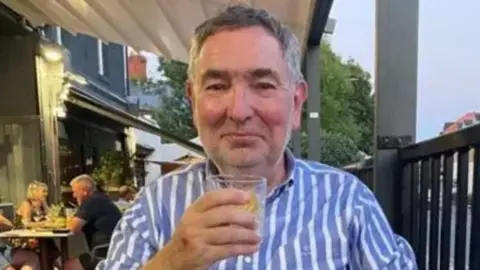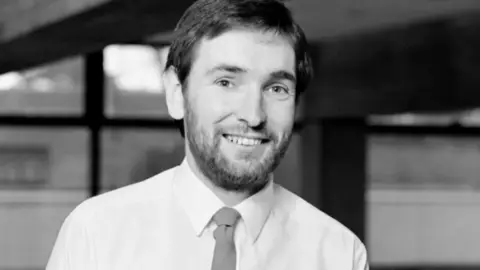 South Wales Police
South Wales PoliceA former BBC editor died accidentally after falling into the River Taff in Cardiff, an inquest has concluded.
The body of Aled Glynne Davies, 65, was found near Cardiff Bay sailing centre on 4 January, 2023, after he went missing from the Pontcanna area of the city on New Year’s Eve.
In Pontypridd on Monday, coroner Kate Robertson concluded that he fell into the river while urinating.
The cause of death was recorded as drowning.
The inquest heard that the family were dissatisfied with the police response after Mr Davies, who previously worked on Radio Cymru, went missing.
A police officer acknowledged at the inquest that the investigation into his disappearance was not good enough.
He added that the case had been referred to the Independent Office of Police Conduct (IOPC).
South Wales Police have been asked to comment.
 Family photo
Family photoThe inquest also heard that his family believed Mr Davies would not have gone to the River Taff on purpose, and that his mood was not low at the time.
He was on strong medication for a number of conditions, including sarcoidosis and osteoporosis, the inquest heard, and those conditions and the medication could potentially cause depression.
But his widow, Afryl, said although he was sometimes tired and ill after taking medication, Mr Davies did not feel depressed.
His GP added that there was no suggestion that Mr Davies had depression when he died.
“Some drugs made him feel weak or sick,” said Dr Sherif Khalifa.
“But he was still looking forward to working on his Sunday morning show, going to the football and seeing the children.”
He added that he had mentioned a lot that he was looking forward to the wedding of his son, Gruff, the last time they spoke at the beginning of December 2022.
‘He intended to come home’
The inquest heard that Mr Davies was seen on the Brewhouse pub’s CCTV camera in Sophia Gardens heading in the direction of Bute Park in Cardiff.
His wife said he was very familiar with the park but added that he was a careful person who would not go there for a walk after dark.
It was unusual he went, she said, but he was positive on the night in question.
She said she thought he had slipped into the river by accident, and would not have gone into the water on purpose.

“He had taken his house keys,” said Ms Davies.
“That proved to me that he intended to come home that night.
“He was afraid of water and felt the cold terribly because of his condition,” she added.
Dr Meleri Morgan, a pathologist at the University Hospital of Wales, told the inquest that Mr Davies was alive when he entered the water.
“There was not enough alcohol in his body to prevent him from driving,” she said, “so that would not have had an effect on how he thought and behaved.”
The pathologist referred to “dry drowning” – where the shock of going into the water causes someone to go into cardiac arrest and die suddenly, before the lungs fill with water.
It was likely that that had happened in the case of Mr Davies, she said.
She added that the zip of Mr Davies’ trousers was open when he was found, and that suggested what his family believed, namely that he had slipped into the river while urinating.
She added that she could not rule out that he fell ill, or that he fainted as a result of an arrhythmia and fell into the water.

